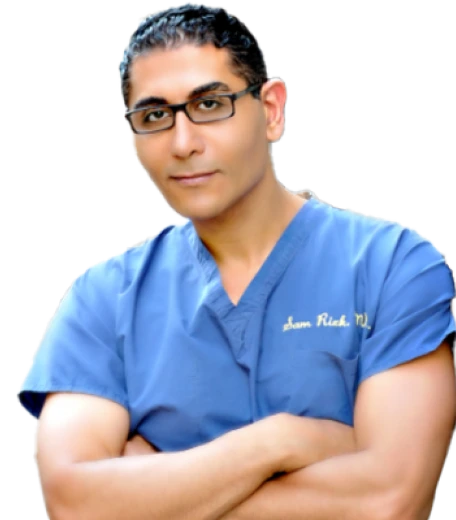Some people mistakenly think that sinusitis is a minor issue, and therefore avoid considering surgery. The reality is, unlike minor sinus problems, sinusitis doesn’t just go away on its own.
The most common causes of sinus problems are allergies, septal deviation and chronic sinusitis. An exam is needed to determine which of these issues is causing your sinus problems. Unfortunately, some people with chronic sinusitis requiring sinus surgery are unaware of their problem because their doctors have failed to conduct a comprehensive evaluation of their medical history and symptoms.
The only way to know for sure if you need sinus surgery is to schedule a thorough examination with an ear, nose and throat specialist (ENT, or otolaryngologist).
Symptoms of Sinusitis
When the sinuses are clogged up and not draining correctly, mucous gathers, builds up and can eventually lead to a range of symptoms, such as:
- Runny nose
- Stuffiness
- Cough with mucus
- Headaches
- Breathing issues
- Excessive drainage into the nose and/or throat
- Bad breath
- Fever
- Tooth pain
- Bad sense of taste and/or smell
Chronic sinusitis can have a dramatic effect on a person’s quality of life. Issues associated with sinusitis — such as allergies, post-nasal drip, snoring, sleep deprivation and sinus congestion — are no fun at all. If you are experiencing any of the symptoms above, it is important that you see your doctor or an ear, nose and throat specialist to determine if you have chronic sinusitis.
When Sinus Surgery Is Necessary
While acute sinusitis often involves a viral infection that will clear up on its own, chronic sinusitis is usually bacterial and will not go away without more involved intervention. To make matters worse, the bacterial infections associated with chronic sinusitis can easily spread. In many cases, surgery is needed to correct the problem.
Before deciding to recommend surgery, your primary doctor or otolaryngologist will likely try what is called maximal medical therapy. The first step in this approach is to conduct a thorough exam and evaluation, which will likely involve allergy testing and possibly other tests. Your ears, nose and throat will all be examined, and the doctor will ask you questions about your symptoms, medical history, allergies, smoking and any medications you are taking. You yourself should prepare a list of questions for the doctor.
Possible treatments that may be employed include nasal corticosteroids to prevent inflammation, as well as saline nasal irrigation and nasal spray to clean out the nasal passages. Over-the-counter decongestants and pain relievers also may be prescribed.
If these treatments prove to be ineffective, your doctor will likely order a CT scan to further assess the blockage of your sinuses. If the scan shows persistent disease, you may need sinus surgery.
There are a number of other reasons that may lead your doctor to conclude that you need surgery, including:
- Nasal or sinus polyps
- Structural abnormalities of the sinuses or nose
- Sinus infection that has spread to bone
- Sinus disease stemming from fungal infection
- Material has remained dormant in your sinuses for more than 45 days
- Chronic sinusitis with HIV
- Sinus cancer
You will need to have sinus surgery if any of these conditions are present, because they will not go away on their own. In many cases of chronic sinusitis, a vicious cycle sets in, starting with a bacterial infection that causes swelling and makes normal drainage difficult or impossible. This leads to a collection of infected fluid that doesn’t respond to antibiotics. Biofilms may develop and bone may become infected. These are relatively serious and very unpleasant issues, thus the need for surgery.
The Procedure: Endoscopic Sinus Surgery
Today, the most common sinus surgery to treat chronic sinusitis is called functional endoscopic sinus surgery (FESS). However, it should be noted that the procedure your ENT performs will depend on your situation. For example, some patients need surgery to repair septal deviation, spreader grafts for internal valve narrowing, or turbinate reduction if the turbinates are contributing to the problem.
During functional endoscopic sinus surgery a small scope with a high-definition camera is inserted into the nose. The camera will project an image onto a TV screen, which will allow your surgeon to see the blockage to or narrowing of your sinuses. Special instruments will be used to enlarge the openings. The “functional” aspect of the surgery refers to the fact that it enlarges the openings and therefore improves the function of the sinuses.
There are several advantages to having endoscopic sinus surgery. The procedure is usually quite effective and typically can be performed on an outpatient basis. The endoscopic technique has few associated complications and there is little pain during the recovery period.
That being said, sinus surgery requires dedication to postoperative care and maintenance, including
diligent use of nasal spray as well as sinus irrigation. Patients need to return to their ENT for endoscopic exams and to clean out the sinuses. Also note that in rare cases sinus surgery will not cure chronic sinusitis. Potential complications include infection, bleeding and (rarely) loss of vision.
Cost and Insurance
Most insurance companies cover the cost of sinus surgery if it is strictly a functional nose surgery and not accompanied with rhinoplasty. You may be responsible for a deductible and/or co-pay or co-insurance, so check with your insurance carrier for details on your policy. If you do not have insurance or if it isn’t covered, you will have to pay out of pocket. The price varies depending on where you have the surgery, and on the complexity of the procedure. However, modern sinus procedures cost less than traditional sinus surgery because there is rarely a hospital stay (and if there is, it is usually short).












